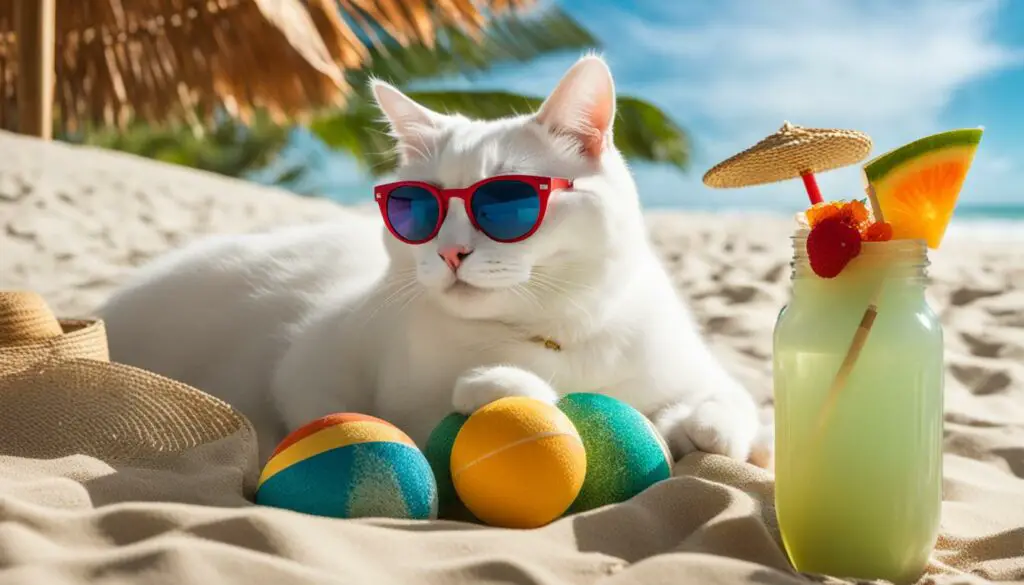Many cat owners wonder about the emotional well-being of their feline friends when they go on vacation. Leaving cats alone for extended periods of time can lead to accidents, injuries, and illnesses. It is important to have a plan in place to ensure their safety and well-being while you are away.
Key Takeaways
- Leaving cats alone for extended periods during vacations can cause accidents, injuries, and illnesses.
- Options for cat care during vacations include taking them with you, having a friend or family member care for them, boarding facilities, or hiring a pet sitter.
- Boarding facilities should be chosen carefully to ensure a comfortable and stress-free environment for cats.
- Hiring a pet sitter can provide personalized attention and minimize stress for cats who prefer to stay in their own environment.
- Preparing your home with essential supplies and providing engaging activities can help cats feel secure during your absence.
Options for Cat Care During Your Vacation
When it comes to taking care of your cat while you’re on vacation, there are several options to consider. Each option has its own advantages and it’s important to choose the one that best suits your cat’s needs. Here are some popular options:
1. Taking Your Cat with You
If your accommodations allow it, bringing your cat along on vacation may be a good option. This way, you can ensure that your feline friend is with you and receiving the care they need. However, keep in mind that some cats may be stressed by travel, so it’s important to make the necessary preparations and ensure their comfort throughout the journey.
2. Having a Friend or Family Member Care for Your Cat
If taking your cat with you is not feasible, you can consider asking a trusted friend or family member to take care of your cat in their home. This can be a great option as your cat will be in a familiar environment with someone they know and trust. Make sure to provide clear instructions regarding your cat’s feeding, medication, and any other specific care requirements.
3. Hiring a Pet Sitter
Another option is to hire a professional pet sitter who can visit your home or stay with your cat. This can be a preferred option for many cats as they can stay in their own environment and maintain their regular routine. A pet sitter can provide personalized attention, feed your cat, clean litter boxes, and ensure they are safe and comfortable. Make sure to choose a reliable and experienced pet sitter who understands your cat’s needs.
No matter which option you choose, it’s important to plan ahead and make sure your cat will receive the care and attention they need while you’re away. Leaving your cat in the hands of a trusted caregiver will give you peace of mind so you can enjoy your vacation knowing that your furry friend is well taken care of.
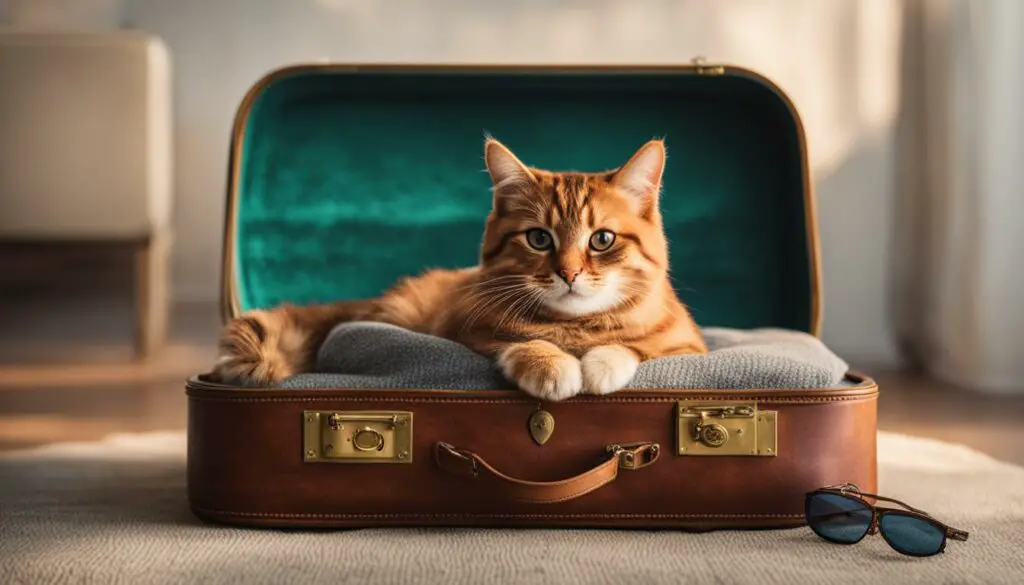
Tips for Boarding Your Cat during Your Vacation
Boarding your cat during your vacation can be a good option if you want to ensure their safety and care while you’re away. Here are some tips to help make the boarding experience as stress-free as possible for your furry friend:
| Tip | Description |
|---|---|
| Research the facility | Look for a boarding facility that understands feline behavior and provides a comfortable environment for cats. Ensure that they have separate areas for cats and dogs and offer ample space for each cat to move around. |
| Provide familiar items | Bring along your cat’s favorite blanket, toy, or bedding to provide a sense of familiarity and comfort in the new environment. The familiar scent can help ease their anxiety and make them feel more secure. |
| Communicate your cat’s needs | Make sure to provide detailed instructions about your cat’s care, including feeding schedules, dietary restrictions, medication administration, and any special needs they may have. This will help the boarding staff provide the necessary care and ensure your cat’s well-being. |
| Stay in touch | If possible, inquire if the boarding facility allows occasional phone calls or video chats with your cat. Hearing your voice or seeing your face can provide comfort and reassurance to your furry friend during your absence. |
Remember, cats can experience separation anxiety, especially in unfamiliar environments. By choosing a reputable boarding facility and providing familiar items, clear instructions, and staying connected, you can help ease your cat’s anxiety and make the boarding experience more enjoyable for them.
Next, let’s explore the benefits of hiring a pet sitter for your cat during your vacation.
Benefits of Hiring a Pet Sitter for Your Cat during Your Vacation
When going on vacation, many cat owners worry about their feline friends and how they will cope with their absence. One option to consider is hiring a pet sitter to take care of your cat in the comfort of their own home. This can provide numerous benefits for both you and your furry companion.
Reduced Stress: Cats are known for their dislike of change, and being taken out of their familiar environment can cause them significant stress. By hiring a pet sitter, your cat can stay at home, surrounded by their own belongings and in a space that they are comfortable in. This helps to minimize anxiety and maintain their routine.
“Hiring a pet sitter can be a great option for cats who prefer to stay in their own environment. A pet sitter can visit your home on a daily basis or stay overnight, providing your cat with familiar surroundings and personalized attention.
Personalized Care: A professional pet sitter understands the unique needs and behaviors of cats. They can provide individualized care based on your cat’s specific requirements, such as feeding schedules, medication administration, and playtime. This level of personalized attention ensures that your cat receives the care they need and helps to maintain their overall well-being.
Peace of Mind: Hiring a trusted and reliable pet sitter provides you with peace of mind while you are away. You can rest assured knowing that your cat is being well cared for and that any emergencies or concerns will be promptly addressed. Regular updates from the pet sitter can also help alleviate any worries and allow you to enjoy your vacation.
Overall, hiring a pet sitter offers numerous benefits for your cat during your vacation. It allows them to remain in their familiar environment, receive personalized care, and reduces stress. Additionally, it provides you with peace of mind knowing that your cat is well taken care of. Consider hiring a professional pet sitter for your next vacation to ensure the happiness and well-being of your furry friend.
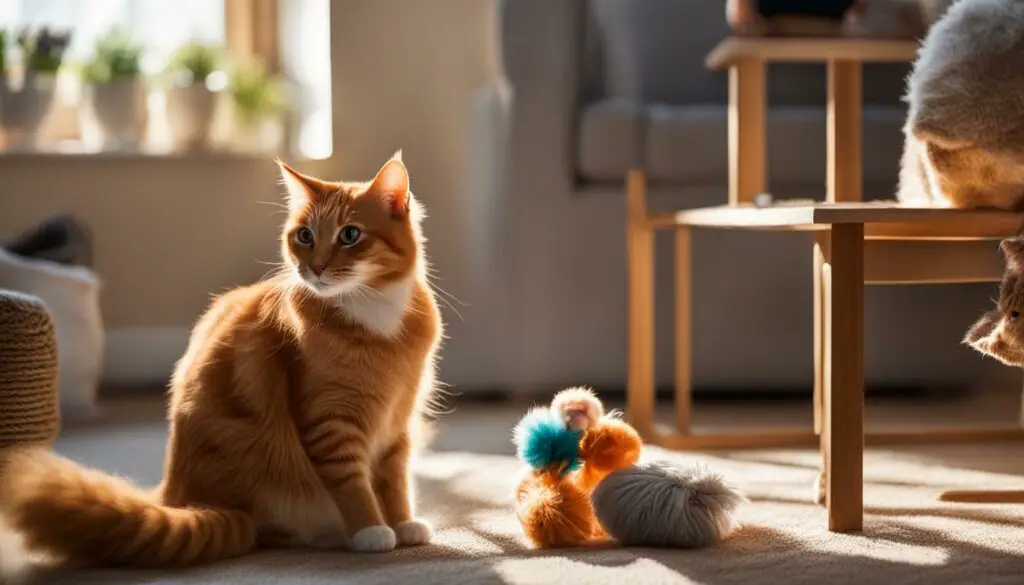
Preparing Your Home for Your Cat’s Care during Your Vacation
When it comes to ensuring your cat’s well-being during your vacation, preparing your home is just as important as making arrangements for their care. By taking the necessary steps to cat-proof your home and providing clear instructions for your pet sitter or caregiver, you can help your cat feel secure and comfortable in their familiar environment.
Here are some key tips to help you prepare your home for your cat’s care:
- Stock up on essential supplies: Make sure you have enough food, litter, and any necessary medications for your cat. This will ensure that their basic needs are met while you are away.
- Set up automatic feeders and water fountains: Automatic feeders and water fountains can help ensure that your cat has access to fresh food and water throughout the day.
- Create a comfortable space: Set up a cozy area with your cat’s bed, blankets, and toys. This will provide them with a familiar and comforting space where they can relax.
- Secure any hazardous areas: Identify and secure any areas of your home that could be potentially hazardous to your cat. This includes locking cabinets or closets where cleaning supplies or other dangerous substances are stored.
By taking these steps, you can help create a safe and secure environment for your cat while you are on vacation, allowing them to feel more at ease and reducing their anxiety during your absence.
Table: Essential Supplies for Your Cat’s Care during Your Vacation
| Item | Quantity |
|---|---|
| Food | 2 weeks’ worth |
| Litter | 2 weeks’ worth |
| Medications | As needed |
| Food and water bowls | 2 sets |
| Bed and blankets | 1 each |
| Toys | A variety |
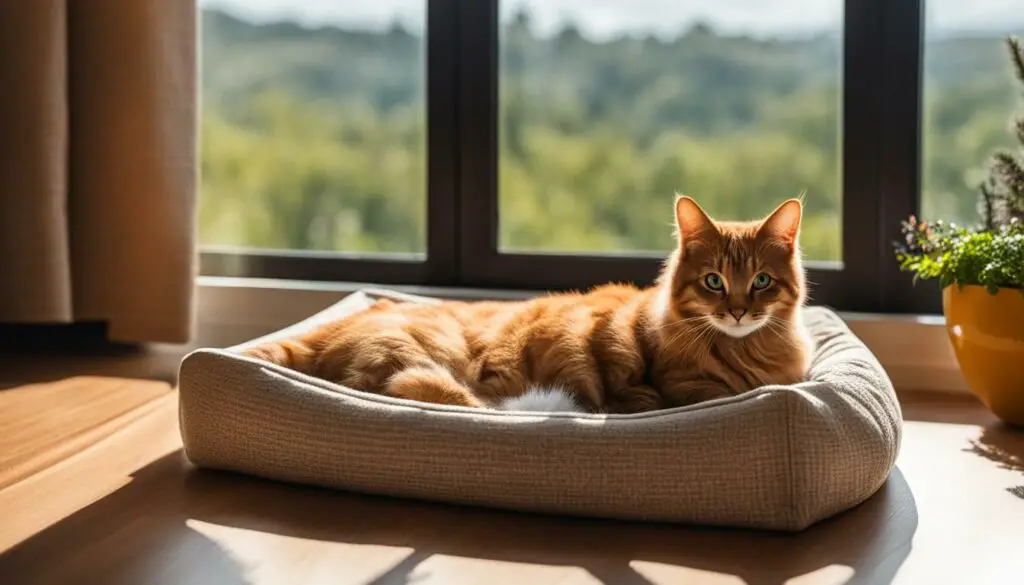
Calming Strategies for Your Cat During Your Vacation
Leaving your cat behind during your vacation can be a stressful experience for both you and your feline friend. Cats are creatures of habit and can experience separation anxiety when their owners are away. However, there are several calming strategies you can implement to help your cat feel more secure and relaxed during your absence.
Providing Familiar Scents
Cats rely heavily on their sense of smell, so leaving unwashed items that carry your scent can provide them with a sense of comfort and familiarity. Items such as socks or bedding that have your scent on them can help calm your cat and reassure them that you will return. Additionally, you can consider using pheromone sprays or diffusers specifically designed to reduce stress and anxiety in cats.
Creating a Soothing Environment
Playing soothing music or leaving the TV on can provide background noise and make your cat feel less alone. Some cats may also benefit from the use of interactive toys or puzzle feeders to keep them mentally stimulated and distracted during the day. Providing a quiet and safe space for your cat, such as a designated hiding spot or a cozy bed, can also help them feel secure.
Maintaining a Routine
Cats thrive on routine, so keeping their daily schedule as consistent as possible can help alleviate their anxiety. Stick to their regular feeding times and play sessions, and try to maintain their usual diet to avoid any digestive issues. Spending quality time with your cat before you leave and when you return can reassure them of your presence and help them adjust more easily to your absence.
By implementing these calming strategies, you can help your cat cope with separation anxiety during your vacation. Remember to consult with your veterinarian if you have any concerns or questions about your cat’s well-being.

The Importance of Routine for Your Cat’s Well-being during Your Vacation
When going on vacation, it is essential to consider the importance of routine for your cat’s well-being. Cats are creatures of habit and thrive on consistency. Sudden changes to their environment can cause stress and anxiety, impacting their overall emotional state. By maintaining their regular schedule as much as possible, you can help them feel safe and secure during your absence.
One key aspect of maintaining routine is to stick to their usual feeding times. Cats are creatures of habit and can become stressed if their mealtime routine is disrupted. Ensure that their food bowls are filled with their preferred diet, giving them a sense of familiarity and comfort. Additionally, continue to engage in play sessions with your cat, allowing them to burn off energy and maintain their daily exercise routine.
Another way to provide a sense of routine for your cat is through spending quality time with them before you leave and when you return from your vacation. Take a few minutes each day to engage in activities that your cat enjoys, such as cuddling, grooming, or playing with their favorite toys. This will help reassure them that you will be back and alleviate any feelings of abandonment.
| Benefits of Maintaining Routine | How to Incorporate Routine during Your Vacation |
|---|---|
| Reduces stress and anxiety | Stick to regular feeding times |
| Provides a sense of familiarity | Engage in play sessions with your cat |
| Maintains their daily exercise routine | Spend quality time with your cat before and after your vacation |
Incorporating routine into your cat’s daily life, even during your vacation, can help them feel secure and loved. Cats are highly sensitive animals, and any disruption to their routine can cause them to feel anxious or stressed. By maintaining their regular schedule, you can minimize these negative emotions and ensure a smoother transition during your absence.
The Benefits of Having Multiple Cats during Your Vacation
During your vacation, having multiple cats can provide numerous benefits for both you and your furry companions. Cats are social animals and having a feline companion can help alleviate feelings of loneliness and separation anxiety. They can play together, groom each other, and provide emotional support, creating a sense of comfort and security.
When you leave for your vacation, your cats can rely on each other for companionship, reducing the stress of being alone. They can engage in interactive play, chase each other around, and explore their environment together. This shared activity and stimulation help keep them mentally and physically active, preventing boredom and potential behavior problems.
Table: Benefits of Multiple Cats during Your Vacation
| Benefits | Description |
|---|---|
| Companionship | Cats provide emotional support and reduce feelings of loneliness. |
| Play and Stimulation | Multiple cats can engage in interactive play, keeping each other entertained and mentally stimulated. |
| Reduced Stress | Having a feline companion can help alleviate separation anxiety and provide a sense of security. |
It’s important to ensure that you have enough resources for each cat, such as litter boxes, food bowls, and resting areas. This helps prevent any potential territorial disputes and ensures that each cat has their own designated space. Providing multiple resources also reduces the risk of stress-related issues caused by resource guarding.
Overall, having multiple cats during your vacation can enhance their well-being and create a harmonious environment. They can rely on each other for companionship, play, and emotional support, minimizing the impact of your temporary absence. Be sure to introduce any new cats slowly and ensure that they get along well before your vacation to avoid unnecessary conflicts.
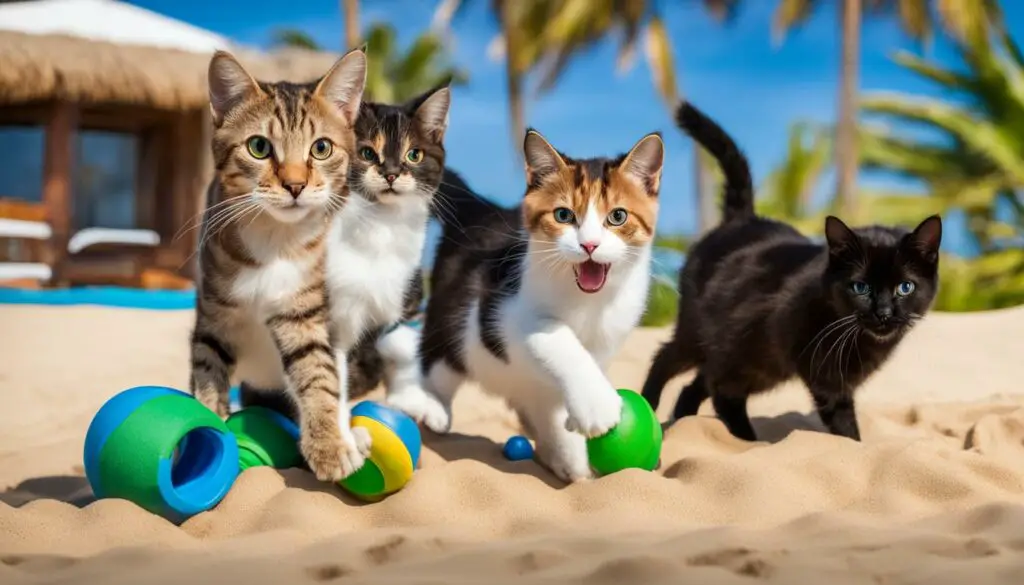
Engaging Activities for Your Cat during Your Vacation
When you go on vacation and leave your cat behind, it’s important to provide them with engaging activities to keep them entertained and stimulated. Cats can easily become bored and lonely in your absence, so offering interactive toys, scratching posts, and window perches can help keep them entertained.
One way to engage your cat during your vacation is by leaving interactive toys that encourage their natural hunting instincts. Puzzle feeders and treat-dispensing toys provide mental stimulation and rewards as your cat tries to retrieve their food or treats. These toys can keep them occupied and entertained throughout the day.
Another option is to provide your cat with scratching posts and cat trees. Cats have a natural instinct to scratch and climb, so having designated areas for these activities can prevent them from scratching your furniture and provide them with exercise. You can also create a cat-friendly environment by placing shelves or cat trees near windows, allowing them to perch and observe their surroundings.
| Engaging Activities for Your Cat during Your Vacation | Benefits |
|---|---|
| Interactive toys | Stimulates natural hunting instincts |
| Scratching posts and cat trees | Prevents furniture damage and provides exercise |
| Window perches | Allows cats to observe their surroundings |
In addition to toys and scratching posts, window perches can be a great source of entertainment for your cat. Cats love to watch birds and other animals outside, so placing a bird feeder near a window can provide visual stimulation. Your cat can spend hours observing the birds, which can help keep them entertained and engaged.
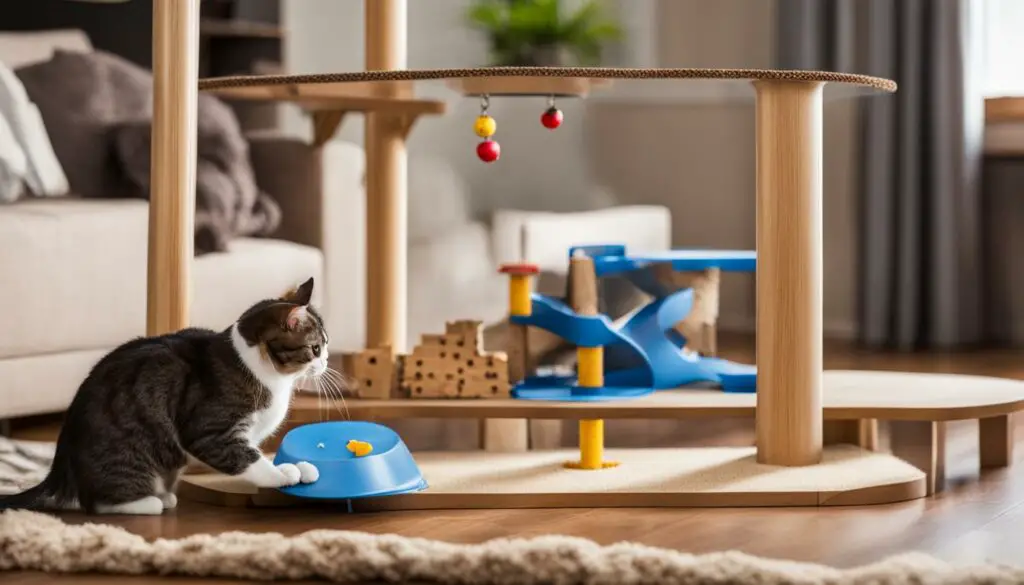
By providing engaging activities for your cat during your vacation, you can help prevent boredom and loneliness. These activities stimulate their natural instincts, provide mental and physical exercise, and make their time alone more enjoyable. Remember to choose activities that are safe and suitable for your cat’s age, size, and abilities. With the right entertainment, your cat will be happy and content until you return from your vacation.
The Importance of Transition Periods for Your Cat during Your Vacation
When going on vacation, it’s crucial to consider the well-being of your feline friend and ensure a smooth transition for them. Cats can experience stress and anxiety when faced with changes in their routine or environment. To help your cat feel secure and relaxed during your absence, it is important to establish a transition period before your vacation.
The transition period allows your cat to become familiar with their caregiver or new environment, reducing any feelings of abandonment or fear. Start by having the caregiver visit your cat a few times while you are still at home. This will help your cat get used to their presence and build trust. Gradually increase the duration of these visits until your cat feels comfortable and at ease with the caregiver.
During the transition period, it’s also essential to provide your cat with familiar comforts, such as their favorite toys, bedding, and food. These familiar scents and items can help alleviate any anxiety your cat may feel during your absence. Additionally, maintaining their regular routine as much as possible will provide stability and reassurance.
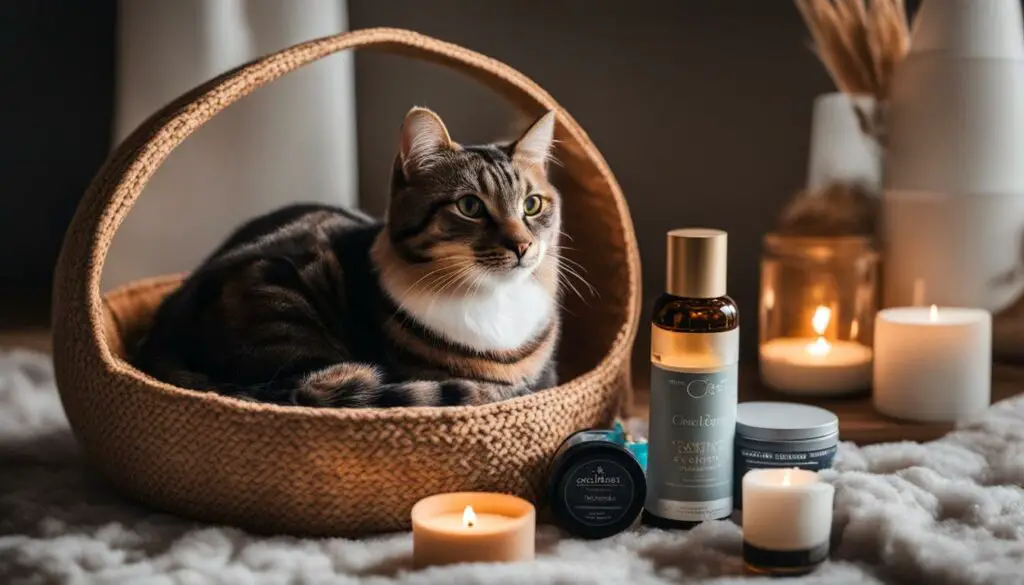
By implementing a transition period and taking steps to ensure your cat feels secure and loved during your vacation, you can minimize their stress and anxiety. Remember to maintain open communication with your caregiver, provide them with detailed instructions, and keep in touch to ensure your cat’s well-being. With proper planning and care, you can enjoy your vacation knowing that your beloved feline friend is in good hands.
Coping with Cat Separation during Vacation
Going on vacation can be both exciting and nerve-wracking for cat owners. Leaving your beloved feline behind can leave you wondering how they will cope with your absence. Fortunately, there are measures you can take to help your cat feel secure and comfortable while you’re away.
One important step is to communicate effectively with your pet sitter or caregiver. Provide them with detailed information about your cat’s routine, including feeding times, litter box habits, and any specific instructions. Leaving emergency contact numbers and keeping regular touch with your caregiver can give you peace of mind and ensure your cat’s well-being.
Additionally, maintaining a consistent routine is crucial in helping your cat cope with separation. Stick to their regular feeding and play times to provide them with a sense of stability and security. Spending quality time with your cat before you leave and when you return can reassure them of your presence and strengthen your bond.
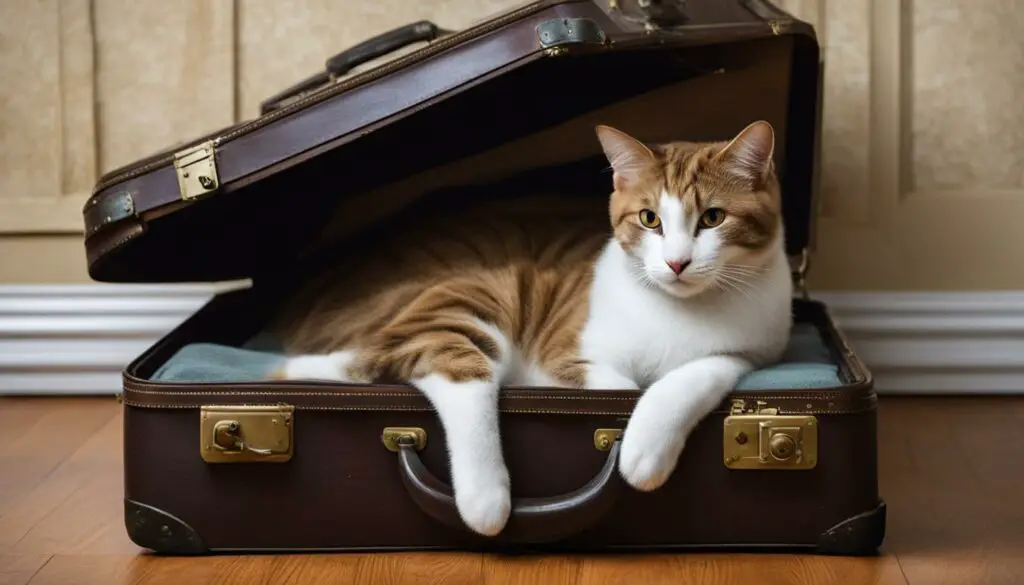
Returning Home and Reconnecting with Your Cat after Your Vacation
After enjoying a much-needed vacation, returning home to your furry friend can be an exciting and heartwarming experience. However, it’s important to reintroduce yourself to your cat in a calm and gentle manner to ensure a smooth transition. Remember, your cat may have experienced some anxiety or stress during your absence, so giving them space and time to adjust is crucial.
As you walk through the door, resist the temptation to overwhelm your cat with attention. Instead, allow them to approach you on their own terms. Offer treats or their favorite toys as a way to initiate positive interactions. This helps to rebuild trust and strengthen your bond after being apart.
“The joy of reunion with your cat after a vacation can be an incredibly fulfilling experience. Take it slow, be patient, and let your cat dictate the pace of reconnecting.”
Engaging in playtime is another effective way to reconnect with your cat. Use interactive toys or engage in gentle play sessions to stimulate their mind and body. This not only helps to reinforce your bond but also provides much-needed exercise and mental stimulation for your furry friend.
It’s important to note that some cats may initially appear distant or aloof upon your return. This is a normal response and should not be taken personally. Give your cat the time and space they need to readjust to your presence. As days go by, you will likely see your cat gradually becoming more affectionate and comfortable around you.
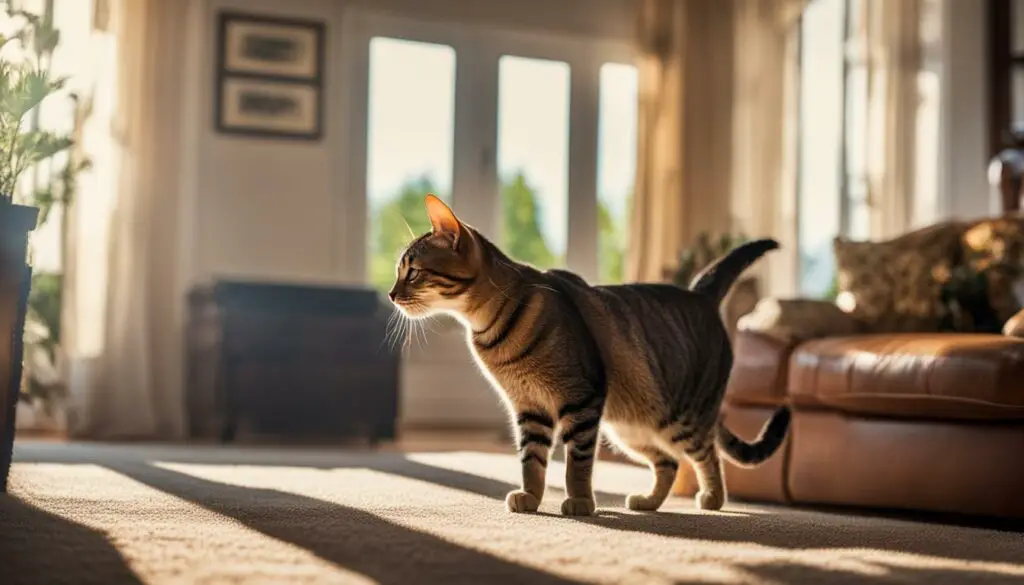
Remember, every cat is unique and may require different amounts of time to fully readjust. Providing your cat with love, attention, and reassurance will help them feel secure and loved once again. And before you know it, you and your feline friend will be back to enjoying your daily routines together!
Coping with Cat Separation during Vacation
Leaving your cat behind when going on vacation can be a challenging experience, both for you and your furry friend. Cats are creatures of routine, and sudden changes in their environment can cause stress and anxiety. However, with the right strategies and care, you can help your cat cope with the separation and ensure their well-being.
One effective way to ease your cat’s separation anxiety is to maintain their routine as much as possible. Stick to their regular feeding times and play sessions, and provide them with familiar scents by leaving unwashed items that carry your scent. This can help to alleviate their stress and provide a sense of security.
Additionally, engaging activities can help distract your cat and keep them entertained during your absence. Leave interactive toys, scratching posts, and puzzle feeders to provide mental stimulation. Creating a cat-friendly environment with vertical space, such as shelves or cat trees, allows them to explore and observe their surroundings. Consider leaving a bird feeder outside a window where your cat can watch birds for added stimulation.
| Strategies for Coping with Cat Separation during Vacation | Benefits |
|---|---|
| Stick to your cat’s regular routine | Provides a sense of security and familiarity |
| Leave unwashed items with your scent | Alleviates separation anxiety |
| Provide engaging activities and toys | Distracts and stimulates your cat |
| Create a cat-friendly environment | Allows for exploration and observation |
Communication with your pet sitter or caregiver is also crucial during your vacation. Provide them with all necessary instructions, including feeding preferences, medication needs, and emergency contact information. Regular updates on your cat’s behavior and health can help ensure their well-being while you are away.
Remember, each cat is unique, and it may take time for them to readjust when you return from your vacation. Be patient and give them space to approach you on their terms. Offer treats, playtime, and gentle interactions to rebuild the bond between you and your cat. Keep an eye on their behavior and well-being, and consult with your veterinarian if you notice any concerning changes.
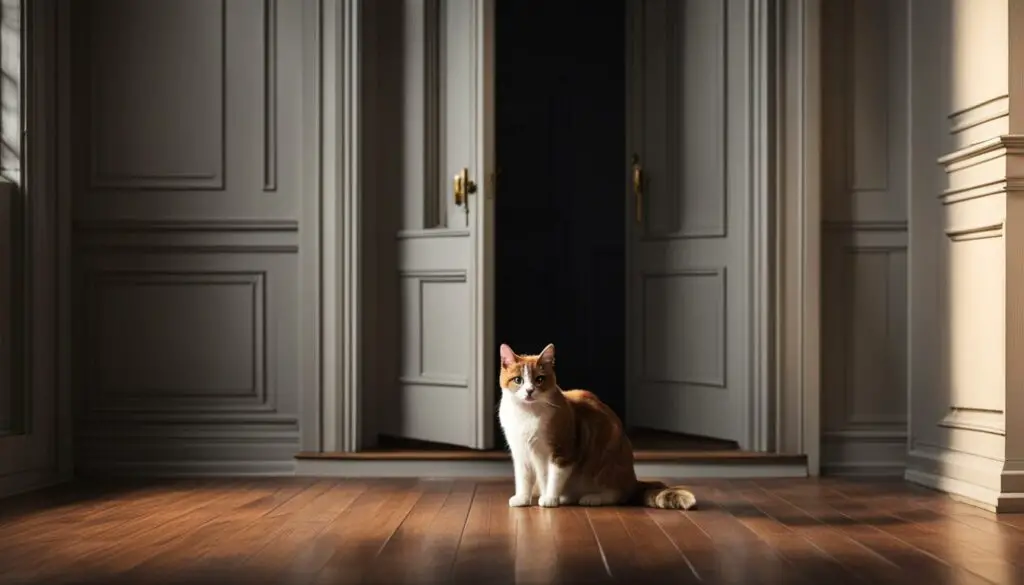
Supporting Your Cat’s Well-being during Your Vacation
- Maintain your cat’s routine as much as possible
- Leave unwashed items with your scent
- Provide engaging activities and toys for mental stimulation
- Create a cat-friendly environment with vertical space
- Communicate with your pet sitter or caregiver for updates
- Be patient and give your cat time to readjust upon your return
- Monitor your cat’s behavior and consult with your veterinarian if needed
Conclusion
Leaving cats behind when going on vacation can be a stressful experience, both for the cats and their owners. However, by taking the necessary steps to ensure their comfort, safety, and well-being, we can alleviate their anxieties and make the separation more manageable. Whether you choose to board your cat, hire a pet sitter, or make arrangements for them to stay with a friend or family member, there are ways to help them feel secure and loved during your absence.
It is important to remember that cats have emotions and can feel abandoned when their owners are away. To minimize their distress, maintaining their routine is crucial. Stick to their regular feeding times and play sessions, and avoid sudden changes to their environment. By doing so, you can ease their anxiety and make them feel safe and secure.
Engaging activities and mental stimulation are also essential for your cat’s well-being during your vacation. Leaving behind interactive toys, scratching posts, and window perches can keep them entertained and provide an outlet for their natural instincts. Creating a cat-friendly environment with vertical space allows them to explore and observe their surroundings, promoting a sense of enrichment and engagement.
Finally, when you return from your vacation, take the time to reintroduce yourself to your cat slowly. Allow them to approach you on their terms, and offer treats, playtime, and gentle interactions to rebuild the bond between you and your feline friend. By providing your cat with reassurance and love, you can help them readjust to their regular routine and feel secure once again.
FAQ
Do cats feel abandoned when you go on vacation?
Cats can experience separation anxiety when their owners are away, but with the right care and preparations, you can help alleviate their anxieties and ensure their well-being.
What are the options for cat care during your vacation?
You can take your cats with you if your accommodations allow it, have a friend or family member take care of them, utilize boarding facilities, or hire a pet sitter to visit your home or stay with your cat.
How can you ensure your cat’s comfort and well-being when boarding?
Look for a boarding facility that understands feline behavior and offers separate housing for cats. Provide detailed instructions about your cat’s care and any special needs they may have.
What are the benefits of hiring a pet sitter for your cat?
Hiring a pet sitter allows your cat to stay in their familiar environment, minimizing stress and maintaining their regular routine. Choose a trusted and reliable pet sitter who understands your cat’s needs.
How can you prepare your home for your cat’s care during your vacation?
Cat-proof your home, stock up on essential supplies, and set up automatic feeders, water fountains, and litter boxes. Leave detailed instructions for the pet sitter or caregiver.
What are some calming strategies for your cat during your vacation?
Leave unwashed items with your scent, play calming music or leave the TV on, and provide puzzle feeders and interactive toys to keep your cat occupied.
Why is routine important for your cat’s well-being during your vacation?
Cats thrive on routine, and maintaining their regular schedule helps them feel safe and secure. Stick to their usual feeding times, play sessions, and provide extra love and attention.
What are the benefits of having multiple cats during your vacation?
Multiple cats can provide comfort and companionship for each other, alleviating feelings of loneliness and separation anxiety. Ensure there are enough resources for all cats to avoid territorial disputes.
What engaging activities can you provide for your cat during your vacation?
Leave interactive toys, scratching posts, and window perches to provide entertainment and mental stimulation. Create a cat-friendly environment with vertical space for exploration.
Why is a transition period important for your cat during your vacation?
Introduce the caregiver gradually to help your cat adjust to their presence and reduce stress. Start with short visits while you are still at home and gradually increase the duration.
How can you communicate effectively with your pet sitter or caregiver during your vacation?
Provide all necessary information about your cat’s routine, feeding preferences, medications, and specific instructions. Leave emergency contact numbers and keep in regular touch to ensure your cat’s well-being.
How can you reconnect with your cat after your vacation?
Give your cat space to approach you on their terms, offer treats and gentle interactions, and be patient if they seem distant initially. Rebuilding the bond takes time.
How should you monitor your cat’s behavior and well-being after your vacation?
Look for any signs of stress or anxiety, changes in appetite, litter box habits, or excessive grooming. Consult with your veterinarian if you notice any concerning behavior.
What should you consider in conclusion?
By taking the necessary steps to ensure your cat’s comfort, safety, and well-being, you can alleviate their anxieties and make the separation more manageable during your vacation.

